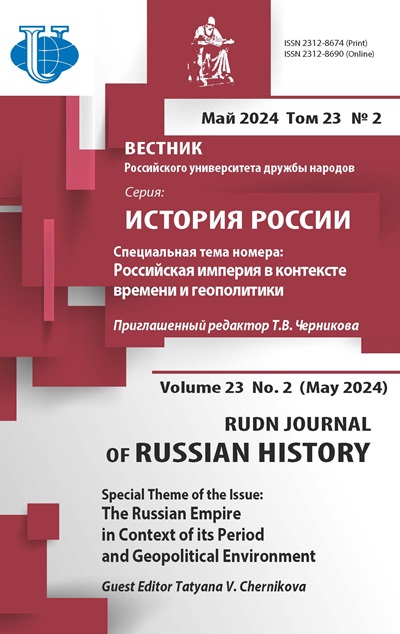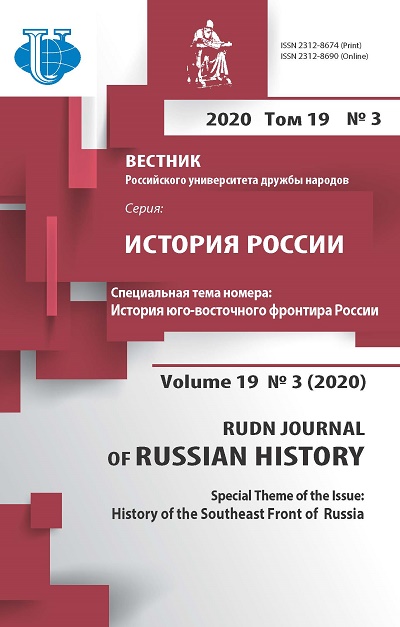Приоритеты государственной политики СССР в сфере признания иностранных документов об образовании в 1950-90-х гг
- Авторы: Григорьева Н.А.1, Коваленко С.А.1
-
Учреждения:
- Российский университет дружбы народов
- Выпуск: Том 19, № 3 (2020): ИСТОРИЯ ЮГО‐ВОСТОЧНОГО ФРОНТИРА РОССИИ
- Страницы: 715-726
- Раздел: СТАТЬИ
- URL: https://journals.rudn.ru/russian-history/article/view/24458
- DOI: https://doi.org/10.22363/2312-8674-2020-19-3-715-726
Цитировать
Полный текст
Аннотация
Статья посвящена исследованию исторического опыта признания иностранных документов об образовании в Советском Союзе. Авторы приходят к выводу, что опыт СССР в указанной области является уникальным. Отдельное внимание в исследовании уделяется особым обстоятельствам вовлечения Советского Союза в международное образовательное пространство в рамках признания иностранного образования. Ввиду различных подходов к вопросам признания и несогласованных с западными партнерами позиций относительно основных определений терминов, относящихся к высшему образованию, сотрудничество с СССР с зарубежными государствами в основном ограничивалось нормативно-правовыми документами ЮНЕСКО, а также двусторонними соглашениями о признании квалификаций со странами «дружеского» лагеря. Кроме анализа эволюции правовых аспектов становления системы признания иностранного образования в СССР в работе исследовано изменение структуры административного советского аппарата, занимающегося вопросами признания. Большой вклад в эту деятельность внесли начиная с 70-х годов специально созданные подразделения Университета дружбы народов имени Патриса Лумумбы и Научно-исследовательский институт проблем высшей школы. Отдельное внимание в работе уделяется сотрудничеству СССР с ведущими международными организациями, такими как ЮНЕСКО и Совет Европы. В статье также проанализированы начальные шаги российского государства по решению проблем признания иностранного образования, которые ввиду произошедших геополитических изменений неизбежно вышли на передний план. В работе представлены основные направления деятельности Советского Союза по решению проблем признания иностранных квалификаций, указаны основные организации и подразделения, принявшие непосредственное участие в решении данных вопросов.
Об авторах
Наталия Анатольевна Григорьева
Российский университет дружбы народов
Автор, ответственный за переписку.
Email: grigoryeva-na@rudn.ru
доктор исторических наук, профессор кафедры истории России
117198, Россия, Москва, ул. Миклухо-Маклая, д. 6Сергей Александрович Коваленко
Российский университет дружбы народов
Email: kovalenko-sa@rudn.ru
кандидат исторических наук, директор Центра сравнительного и международного образования РУДН, доцент кафедры сравнительной образовательной политики УНИСОП РУДН
117198, Россия, Москва, ул. Миклухо-Маклая, д. 6Список литературы
- Белов В.А. Избранные труды. М.: РУДН, 2014. 552 с.
- Билибин Д. Образование в едином и взаимосвязанном мире // ИнкоВуз. 1992. № 2. С. 17-29.
- Житникова Н.И., Зверев М.Н., Ткач Г.Ф. Система образования республики Узбекистан: образовательные программы и присваиваемые квалификации // Научный вестник МГТУ ГА. 2008. № 128. С. 48-58.
- Захарова О.Л., Мураева И.В., Осанов A.B., Смирнов А.Г., Бакрадзе Н.Г., Тимофеев Н.М., Ткач Г.Ф. Системы высшего образования стран Запада: справочник. M.: УДН, 1991. 162 с.
- Зверев Н.И., Житникова М.Н., Ткач Г.Ф. Некоторые практические аспекты осуществления признания и установления эквивалентности иностранных квалификаций // Научный вестник МГТУ ГА. 2007. № 116. С. 26-35.
- Зверев Н.И., Житникова М.Н., Ткач Г.Ф. О параметрах классификации иностранных документов об образовании с учетом специфики их принадлежности к национальным системам образования // Научный вестник МГТУ ГА. 2008. № 128. С. 32-42.
- Коваленко С.А. Международный опыт признания образования и квалификации в стандартах Европейского региона и Российской Федерации в 1960-2015 гг. M.: РУДН, 2018. 195 с.
- Лукичев Г.А. Болонский процесс: движение к созданию образования новой эпохи // Вестник РУДН. Серия: Информатизация образования. 2005. № 1/2. C. 16-23.
- Лукичев Г.А. О признании квалификации высшего образования в Европейском регионе. Значение Лиссабонской конвенции о признании для международной интеграции в сфере образования // Значение Лиссабонской конвенции о признании для международной интеграции в сфере образования. M.: РУДН, 2005. С. 90-104.
- Лукичев Г.А., Скоробогатов В.И. Российская квалификация «специалист» в измерениях европейского пространства высшего образования // Сборник тезисов международной конференции «Практика признания, сближая континенты». M.: РУДН, 2006. С. 24-30.
- Насонкин В.В., Ткач Г.Ф. Общая характеристика систем образовательного законодательства зарубежных стран на современном этапе // Научный вестник МГТУ ГА. 2007. № 116. С. 13-19
- Насонкин В.В. Национальное и региональное измерение государственной образоваельной политики в контексте глобализации: на примере ЕС. СПб: Российский государственный педагогический институт им. А.И. Герцена, 2015. 387 с
- Сенашенко В.С., Ткач Г.Ф. О высшем академическом и профессиональном образовании // Высшее образование в России. 2012. № 4. С. 19-24.
- Сенашенко В.С., Ткач Г.Ф. О тенденциях реформирования российской высшей школы // Высшее образование в России. 2010. № 10. С. 29-42.
- Сенашенко В.С., Ткач Г.Ф. О тенденциях реформирования российской высшей школы // Экономика образования. 2014. № 2. С. 95-98.
- Смирнов А.Г. Высшее образование в Европе // ЮНЕСКО СЕПЕС. 1990. Т. 15. № 2. С. 49-54.
- Тимофеева Н.М., Ткач Г.Ф., Побокова О.П., Самсонова А.А., Вершинина A.M., Захарова O.Л. Системы высшего образования развивающихся стран: каталог. M.: УДН, 1986. 162 с
- Ткач Г.Ф. О некоторых особенностях современного этапа международного образовательного сотрудничества // Инновационное развитие общества: условия, противоречия, приоритеты. M.: МУ им. С.Ю. Витте, 2004. С. 207-212
- Ткач Г.Ф., Чистохвалов В.Н. Введение единого приложения к диплому в целях признания квалификаций российских вузов за рубежом // Научный вестник МГТУ ГА. 2006. № 102. С. 164-167.
- Ткач Г.Ф. Реформа высшего образования Франции // Партнерство Франции и России: интернационализация образования, науки, экономики. М.: РАНХиГС, 2015. С. 24-38.
- Ткач Г.Ф., Сенашенко В.С. Болонский процесс: обзор эволюции приоритетов и промежуточные итоги // Высшее образование в России. 2015. № 7. С. 119-130.
- Филиппов В.М. Реформы образования: аналитический обзор. M.: Центр сравнительной образовательной политики, 2003. 303 с.
- Филиппов В.М. Модернизация российского образования. M.: Просвещение, 2003. 96 с.
- Филиппов В.М. Интернационализация высшего образования: основные тенденции, проблемы и перспективы // Вестник Российского университета дружбы народов. Серия: Международные отношения. 2015. Т. 15. № 3. С. 203-212
- Шевченко Е.Г. Готовимся к децентрализации российской системы признания иностранных документов об образовании // Практика признания, сближая континенты: сборник тезисов международной конференции. M.: РУДН, 2016. С. 74-76
- Чистохвалов В.Н. Особенности модернизации российского и европейского высшего образования в 1991-2005 годах: историко-сравнительный анализ. M.: РУДН, 2010. 331 с
- Чистохвалов В.Н. Формирование и реализация интеграционных образовательных процессов в Российской Федерации и в Европейском Союзе в 1991-2005 годах: сравнительный анализ, опыт, проблемы и перспективы. M.: РУДН, 2010. 351 с
- Bogomolov A.I. Comparability of engineering courses and degrees. A methodological study. Paris: The Unesco Press, 1974. 125 p.
- Bergan S. Recognition issues in the Bologna Process. Brussels: Consul of Europe, 2003. 110 p.
- Bergan S., Rauhvargers A. Recognition in the Bologna Process: policy development and the road to good practice. Brussels: Consul of Europe, 2006. 202 p.
- Bergan S. Not by bread alone. Brussels: Consul of Europe, 2011. 210 p.
- Bergan S., Blomqvist C. The Lisbon Recognition Convention at 15: making fair recognition a reality. Brussels: Consul of Europe, 2014. 167 p.
- Harris J., Wihak, Ch., Kleef, J. van. Handbook of the Recognition of Prior Learning: Research into Practice. New York: UNESCO, 2015. 178 p.
- Kouwernaar K. Recognition instruments in Europe // Higher Education in Europe. 1994. Vol. 19. № 2. P. 7-26.
















